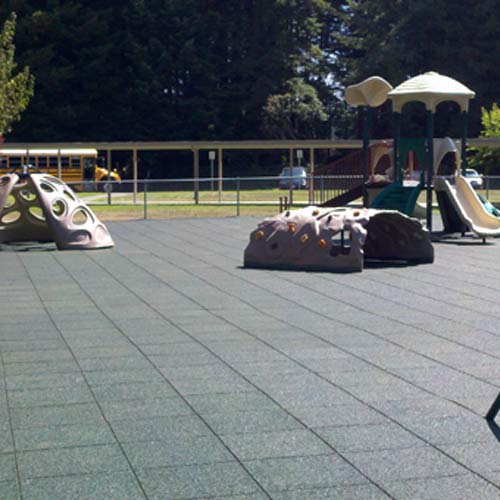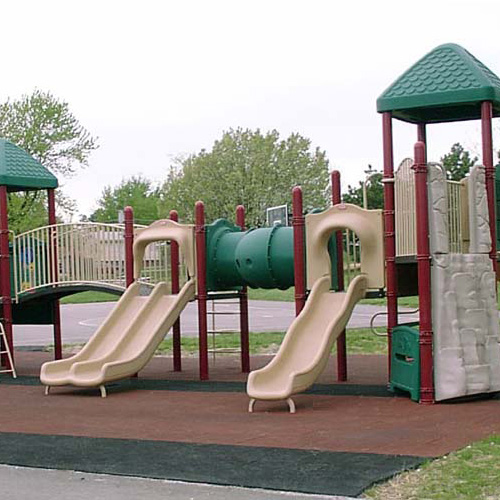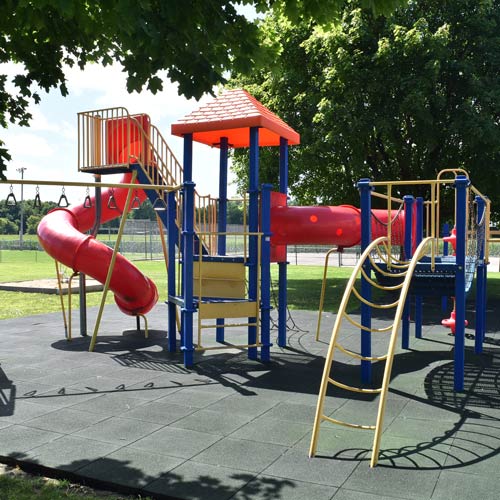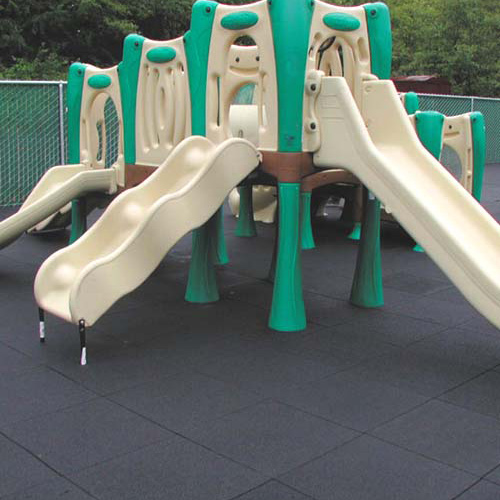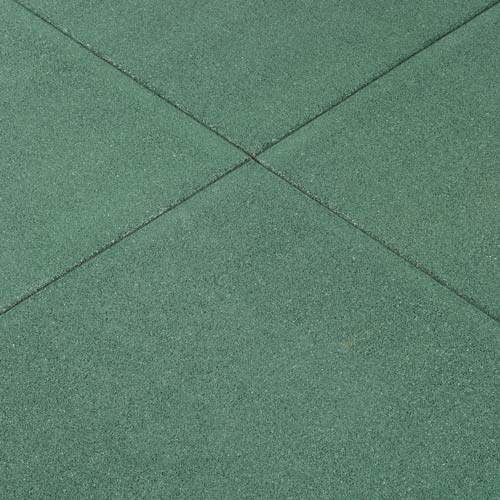Playground Surfacing - Poured vs. Tiles vs. Crumb Fill Rubber Surfaces
Related Product: Blue Sky Playground Interlocking Tile 50/50 EPDM 3.25 Inch x 2x2 Ft.
Traditionally, playground flooring options like loose fill were always the go-to solution. But as we learn more about fall injuries and playground accidents, the more important a fall height-rated surface has become.
As you plan your playground and begin to explore the flooring options available, consider the following pros and cons to each of these flooring choices.
Crumb Fill
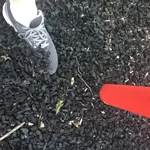 Crumb fill options, including rubber crumb flooring, are present in many playgrounds today. These fill options provide cushion and make for a forgiving surface. Rubber crumb is durable, but this flooring option isn’t without its drawbacks.
Crumb fill options, including rubber crumb flooring, are present in many playgrounds today. These fill options provide cushion and make for a forgiving surface. Rubber crumb is durable, but this flooring option isn’t without its drawbacks.
Because crumb flooring is loose, it’s easily kicked away as kids play, and it can end up on surrounding surfaces, on playground equipment, and kicked out of the play area entirely. High-traffic areas, like the spaces underneath swings and in front of slides, can experience significant flooring wear, exposing the base beneath the crumb fill. With less fill in these areas, kids can be injured by a trip or a fall, and maintenance crews are tasked with the ongoing job of raking fill back where it belongs.
Crumb fill can also potentially conceal safety hazards, like debris that has been tracked or brought into the play area. While crumb fill is forgiving underfoot, it’s not accessible with wheelchairs or other equipment, which limits a playground’s handicap accessibility.
Poured Rubber Flooring
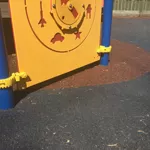 A pour-in-place playground surface is another popular option, and poured rubber playground flooring offers several advantages over a crumb fill option. Pour-in-place rubber flooring can be customized and installed according to the playground’s specific needs and dimensions. This poured-in-place rubber playground surface offers the durability of rubber, making it a long-lasting option that’s suitable for high traffic playgrounds. With a poured rubber surface, a playground can be designed to be handicap accessible.
A pour-in-place playground surface is another popular option, and poured rubber playground flooring offers several advantages over a crumb fill option. Pour-in-place rubber flooring can be customized and installed according to the playground’s specific needs and dimensions. This poured-in-place rubber playground surface offers the durability of rubber, making it a long-lasting option that’s suitable for high traffic playgrounds. With a poured rubber surface, a playground can be designed to be handicap accessible.
Poured rubber does have disadvantages. While it doesn’t need the constant maintenance of a crumb fill flooring, it can crack over time and create tripping hazards. High-traffic areas, like the spaces in front of slides, naturally see increased use, so the flooring in these areas can wear faster than the surrounding spaces.
Installing, repairing and replacing a pour in place playground surface requires a professional, which drives up costs significantly. If one area needs to be repaired, you may have to replace a much larger section of the flooring. Seams and separation are an ongoing concern, especially when you have areas that are newly repaired contrasting with older sections of flooring.
Tile and Mat Playground Surface Options
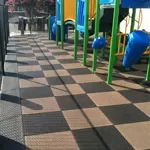 Like poured-in-place flooring, tiles and mats create a consistent surface that can be handicap accessible. Most of these tiles also offer fall height ratings, so you can choose a tile option that is well-paired with the height of the equipment on the playground.
Like poured-in-place flooring, tiles and mats create a consistent surface that can be handicap accessible. Most of these tiles also offer fall height ratings, so you can choose a tile option that is well-paired with the height of the equipment on the playground.
Mats and tiles offer a distinct advantage over poured in flooring when it comes to replacing worn or damaged sections. It’s easy to replace individual tiles, rather than large sections of flooring. This saves both money and tile, while making it easy to keep the entire playground flooring in good condition.
Tiles are also designed to be easy to install. They feature interlocking edges that create strong connections that won’t pull apart during use. Because the tiles are conveniently sized, they can be easily carried and installed. There’s no need to hire a professional installation company, and most maintenance personnel can handle the installation and replacement of worn tiles. You’ll also find that most playground tiles are resistant to UV rays, can withstand extreme temperatures, and offer an ideal surface to maximize traction and safety during play.
It’s also possible to combine tiles and mats with other flooring types, particularly with a poured rubber floor. Laying a heavy-duty playground mat over a pour in place rubber floor adds durability to the floor. Options like swing mats and slide mats protect the flooring from increased wear, maximizing its lifespan.
Choosing the Right Playground Flooring for Your Needs
As you plan your playground, there are multiple factors to consider when choosing the right flooring. In addition to the playground surface costs, it’s also essential to consider the installation and maintenance costs for the type of flooring that you choose.Don’t forget to also consider the types and heights of equipment that you’ll be installing on the playground. Investing in a fall height-rated flooring surface may cost a little more initially, but it can pay off with greater safety for all of the kids who use the area.
Choosing the right playground flooring is a matter of balancing safety needs, durability, ease of installation, and overall costs. We carry a wide array of flooring options here at Greatmats that are suitable for many different budgets and playground needs.
